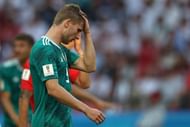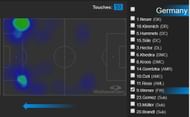
So it has happened. As soon as the referee blew his whistle to reverse his linesman’s offside decision on South Korea’s first goal, it was all over. In the end, Gary Lineker was wrong- 22 men chased the ball around for 90 minutes, and the Germans lost. In fact, they lost twice in the group stages for the first time in their World Cup history. For most teams, exiting the World Cup after the group stages are rather disappointing. For the Germans, it is a catastrophe that will never be forgotten- perhaps the darkest day in the nation’s long storied footballing history.
Like any major footballing exit, an autopsy will follow Germany’s collapse. Changes will be necessary as everyone from to the football federation’s head to head coach Joachim Low will be in danger of losing their job. Before we get to that point, it is necessary to examine some of the reasons behind Germany’s unprecedented exit.
It should be noted that this analysis ignores one of the biggest reasons for Germany’s early flight from Russia: luck. After all, World Cup football is more about luck than we realize. Within 270 minutes, a few ricochets here and there can decide the fate of a team. As Mats Hummels will tell you, Germany were millimetres away from scoring on multiple occasions especially against South Korea. However, a team like Germany should be good enough to overcome bad luck. So let’s look at why they weren’t able to.
#5 No ‘Target Man’

Throughout his career, Miroslav Klose was never really appreciated for his quality. The German is the record goalscorer at the FIFA World Cup, but that achievement is often attributed to his longevity and the team around him (rightly so). What was often ignored was how vital Klose was to Germany’s success. At the beginning of the 2014 World Cup, Low tried to play with various ‘false nines’ as he left Klose out of the lineup- preferring more creative players.
Even though the approach worked against Portugal, the Die Mannschaft struggled against Ghana, USA and Algeria, Low’s team missed a target man as they only scored five goals against these rather inferior outfits. It was only after the Algeria game that Low started Klose and the rest is history as Germany romped to the title.
In Russia, Germany missed Klose again as Timo Werner has turned out to be an inadequate replacement. Werner was expected to be a younger and more technically skilled version- like Klose in his youth. Instead, the RB Leipzig striker was poor throughout the tournament (apart from the second half vs Sweden) with a horrid WhoScored player rating of 6.29 (ranked 348 out of 428 players in the tournament).
Part of Werner’s problem was that he just didn’t get into typical areas for a striker. Thus when through balls and crosses came in, he wasn't there to take advantage. Instead, less potent finishers like Hummels, Jonas Hector and Leon Goretzka missed chances. Just look at Werner’s heat map from the game against the Korea Republic:

As one can see, most of Werner’s touches in the match were at the outer edges of the penalty box. Klose’s heat map would have certainly been different in a similar game. It is little wonder that Germany’s attack looked more potent when Mario Gomez was at the helm. Even though the big striker is less technically proficient than Werner, at least his presence gave Germany’s attack some sort of direction. In the end, Germany didn’t get the creative quality of a false nine or the instincts of a target man, instead, they got Werner.
#4 Stale Tactics

Like their 2014 World Cup final opponents Argentina (at least in their first game), Germany’s tactics have grown stale. Joachim Low has played a version of his 4-2-3-1 for the past eight years. In fact in Germany’s opening game against Mexico, Low played five of the same starting XI as the 2010 World Cup quarterfinal against Argentina and seven of the same starting XI as the 2014 World Cup semifinal against Brazil. Even Low’s replacements are like for like replacements-Joshua Kimmich for Philipp Lahm, Jonas Hector for Benedikt Howedes and Werner for Klose (theoretically at least).
The only real tactical change that Low has made is playing an attacking midfielder (Draxler or Marco Reus) instead of Bastian Schweinsteiger- allowing Toni Kroos to move back into central midfield. That has only exposed Germany to counter-attacks (more on that later). While Germany’s fast attacking 4-2-3-1 was refreshing in 2010, even the best tactics grow stale over eight years.
Mexico, Sweden and South Korea’s managers are too clever not to understand Germany’s formation and how to best exploit it. Mexico chose to focus on the counter-attack while South Korea focused on defending compactly in the centre of park- realizing that most of Germany’s attacks came through that area. It is little wonder that Germany’s best period in the World Cup came when they switched to a 4-4-2 in the second half against Sweden. That formation may not have been the most ideal considering the makeup of the squad yet the change was enough to perturb the Scandinavians.
There was no need for Germany to make any major changes to their tactics or philosophy. After all the system had worked brilliantly over the best part of the past decade. However, some changes could have made a difference- perhaps playing Gomez up front (adding an aerial dimension to their attack) or switching to a three man defence. Anything really, would have been better than the same old stale 4-2-3-1.
#3 Lack of Pace

Germany’s staleness wasn’t limited to their tactics as the team lacked pace throughout the team. In defence, Hummels and Boateng are both great players- but none of them posses the pace of a Gerard Pique or Rio Ferdinand. This prevented Germany from playing a more aggressive high line. While Kimmich and Hector are certainly quicker, they are not as fast as most full-backs are expected to be in this day and age. Thus, the full-backs struggled to get back on counter-attacks (more on that later).
However, where this lack of pace really proved problematic was in attack. Germany dominated possession in all of their games- averaging a ridiculous 656.3 passes per game- 2nd highest in the tournament. Despite all these possession, Germany were found it difficult to score against compact well organized defenses. This was mainly due to their lack of pace as they had very few players with the ability to get behind a defence. In Kroos and Ozil, they perhaps had two of the tournament’s slowest attack-minded players. In addition, the likes of Muller, Draxler and Goretzka aren’t particularly known for their pace either.
Even the players who were supposedly “pacey” like Reus and Werner struggled to provide another dimension to Germany’s pass heavy attack. Reus did not seem like he was at 100% throughout the tournament as he did not have his usual burst of pace. Werner on the other hand spent most of the time on the wing (as discussed earlier) rather than trying to get behind the defence. Thus it is little wonder that Germany averaged the 9th least dribbles in the tournament as they did not have enough players who could take on opposing defenders. They also ranked 1st in shots outside the area- a clear sign that they were unable to break down more defensive teams. All Germany needed was a pacey winger with competent crossing and shooting ability. I wonder what Leroy Sane has to say about that.
#2 Vulnerability to Counter-Attacks

It has always been Germany’s major weakness. The team’s tendency to attack relentlessly the focus on technical (rather than physical) ability in midfield has left them vulnerable to counter-attacks. The lowest moments of Low’s tenure came in Euro 2012 and Euro 2016 when losses against Italy and France respectively were sealed after opposition counter-attacks.
There was perhaps no better team to exploit this than Mexico. El Tri had one of the world’s most promising wingers in Hirving Lozano who terrorized the attack-manded Kimmich on the German right. They also had Javier Hernandez- one of the world’s most potent strikers on the counter along with Carlos Vela, a threatening winger in his own right. Low did not help matters by playing an extra attacking midfielder in Draxler- thus relying solely on Sami Khedira in defensive midfield. The Juventus midfielder is a shadow of his former self and this was ruthlessly exposed by Mexico. On countless occasions in the first half, Lozano and Hernandez combined to create chances for each other. It was no surprise really when Lozano finally converted one of those chances.
After the game, Germany seemed to have realize how vulnerable they were to counter-attacks. Khedira was quickly jettisoned in favor of a more mobile defensive midfielder in Sebastian Rudy. Yet that approach only lasted half a hour as Rudy went off with an injury- within minutes, Germany conceded due to a quasi counter-attack after a Kroos error. This continued against South Korea (as Khedira started) where Germany were exposed on multiple occasions on the counter as they looked for an all-important winner. In fact, a team with more quality than Korea may have scored much before the 90th minute. This was the tournament in which Germany’s only (and relatively minor) tactical flaw turned out to be its biggest one.
#1 Complacency and Chemistry Issues

In the end, all the above issues are moot. Even with a struggling target man, stale and ineffective tactics, lack of pace, vulnerability to counter attack, this Germany team should have made the knockout stages. A team with the best goalkeeper (Neuer), one of the best right-backs (Kimmich), perhaps the best centre-back pairing (Hummels and Boateng), one of the best central midfielders (Toni Kroos) along with Reus, Werner, Ozil and Draxler in attack should automatically be making the quarter-finals.
Something else was clearly afoot- complacency was certainly a factor. No team has dominated World Football over the past ten years like Germany- they have reached the semi-final in every major competition since Euro 2004 and have won the World Cup during that time. It is certainly natural for the players to be a little complacent considering that history of success. This could be seen against Mexico and South Korea when the entire team had very little intensity until the situation got dire. the situation really started to look dire. One could also assume this applied to management. Reus implied that he hadn’t started for the first game because he was “being saved for the important games”. It turns out that Germany’s opening game was their most important one.
Yet, complacency doesn’t fully explain Germany’s exit from the World Cup. In previous years, there had been varying reports of a disconnect in the German dressing room. Usually these were put aside, as Germany romped to the semi-finals. In this tournament though, one could see from the beginning that something was not right. This was confirmed when a Guardian column revealed that there were cliques within the squad after the Mexico game. In addition, Hummels chose to criticize team management for the defensive issues that were displayed in that game.
This was also clear in the performances of certain players. Jerome Boateng looked like he had something to prove and his misadventures led to a red card against Sweden (thus rendering him unavailable for the South Korea match). On the other hand, Thomas Muller looked strangely detached as he failed to make his usual impact on the World Cup. Low was also inconsistent throughout the tournament, his decision to leave out Sane has become even more puzzling considering the events of the past fortnight. Even today against South Korea, the decision to make five changes suggested some sort of discord and disconnect within the team.
In the end, we will only know the importance of these factors in a few years when players and management give their account of this disastrous campaign. It sure won’t be pretty and neither was Germany’s performance at the 2018 FIFA World Cup.
